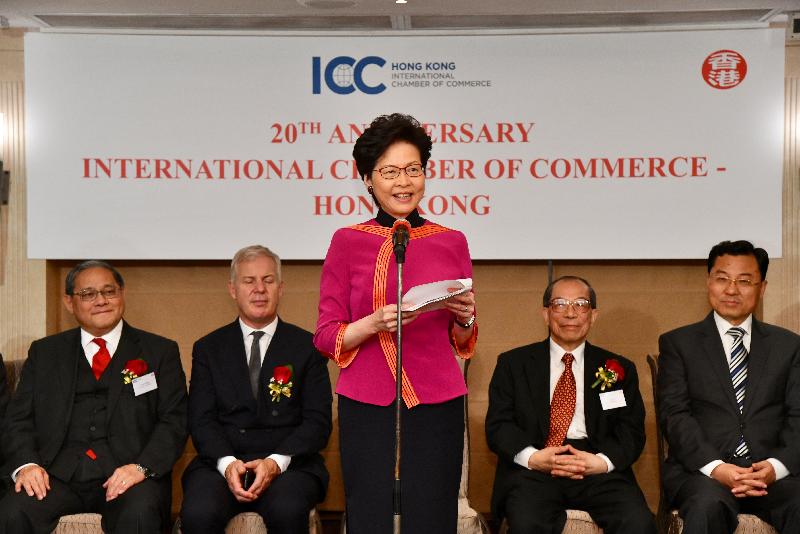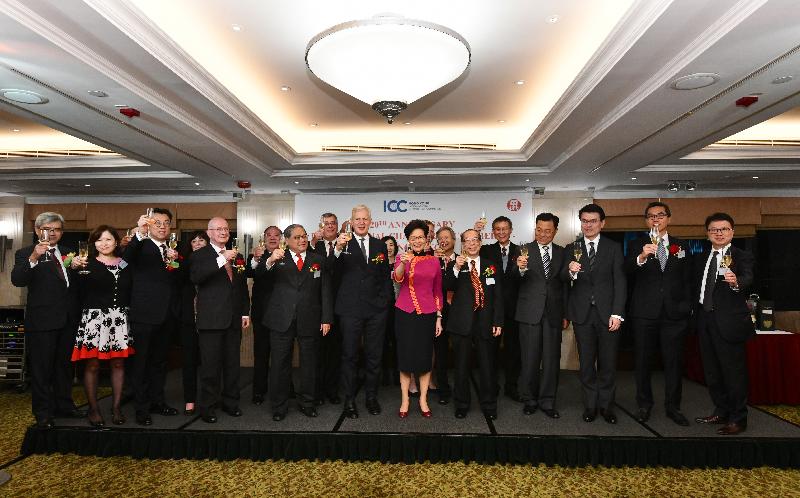Speech by CE at ICCHK 20th Anniversary Reception (English only) (with photos/video)
***********************************************************************************
Commissioner Xie Feng (Commissioner of the Ministry of Foreign Affairs of the People's Republic of China in the Hong Kong Special Administrative Region), J P (Chairman of the International Chamber of Commerce - Hong Kong, Mr Lee Jark-pui), ladies and gentlemen,
Good evening. I am pleased to join you tonight in celebration of the 20th anniversary of the International Chamber of Commerce - Hong Kong.
From its very beginnings in December 1998, the Hong Kong representative body of the International Chamber of Commerce has played an instrumental role in promoting Hong Kong's advantages to the world. It has, as well, assisted the Hong Kong business community in expanding our presence in international commerce, while boosting our singular place as the business bridge between the Mainland of China and a world of opportunities.
The results are certainly encouraging. At last count, more than 8 700 overseas and Mainland companies maintain an office in Hong Kong. Among them, 1 530 have chosen to set up regional headquarters here, representing an increase of 8 per cent over a year ago. Meanwhile, Hong Kong's ranking in World Bank's latest Doing Business Report has risen from the fifth to the fourth. That is testimony to Hong Kong's business-friendly environment, from our simple and competitive tax regime to the level playing field we offer all business, whatever they do and wherever they come from.
No less important, business works best when government is small and the environment encouraging. Hong Kong, built on free enterprise, inspires business confidence. As J P has just noted, the Washington-based Heritage Foundation has named Hong Kong the freest economy in the world for the past 24 years in its annual Index of Economic Freedom report. In explaining our top ranking, the Heritage Foundation said of Hong Kong, and I quote, "an exceptionally competitive financial and business hub" with "little tolerance for corruption", adding that "a high degree of transparency enhances government integrity". I do like those words, and what they say about Hong Kong. And I'm determined that my Government will continue to live up to them.
What makes Hong Kong unique is more than our business environment, as enabling as it may be. Our singular strength is the "one country, two systems" framework Hong Kong enjoys under the Basic Law. We will continue to take full advantage of this fundamental strength while at the same time play a more proactive role in functioning as a "facilitator" and a "promoter" and striving to expand our connections with the world.
A little over a week ago, I attended this year's Asia-Pacific Economic Cooperation Economic Leaders' Meeting in Port Moresby, Papua New Guinea, and met with a number of leaders. It was my 11th overseas trip and the 12th country visited since I took office last July. All these trips have been fruitful, allowing us to tell the world about the successful implementation of "one country, two systems", to explore new markets and to raise Hong Kong's profile in the world.
Less than two weeks ago, we concluded negotiations on a free trade agreement and a related investment agreement with Australia. That agreement and another with the Maldives which has also been concluded bring the number of free trade agreements we've signed or are about to sign to nine, involving 21 global economies. And in January next year, our free trade agreement with the Association of Southeast Asian Nations, signed last November, will begin to take effect.
Opportunities brought by "one country" are all but boundless, thanks to the Belt and Road Initiative and the Guangdong-Hong Kong-Macao Greater Bay Area. This Greater Bay Area, encompassing Hong Kong, Macao and nine cities in Guangdong Province, will create an enormous regional economy, one boasting nearly 70 million people and a GDP worth US$1.5 trillion. The infrastructure connecting Hong Kong to the Greater Bay Area is world-class, with the opening of the Hong Kong-Zhuhai-Macao Bridge last month and the commissioning of the Hong Kong Section of the Guangzhou-Shenzhen-Hong Kong Express Rail Link in September.
The Belt and Road Initiative, designed to boost connectivity between the Mainland of China and countries spanning three continents, also offers unparalleled opportunities for Hong Kong business. Our financial and professional services sector, in particular, stands to gain, given the overwhelming need for investment capital that big-ticket infrastructure development demands.
We are also committed to promoting Hong Kong as an international dispute resolution centre for the Belt and Road, as I noted in my Policy Address in October. Our plans include developing a Belt and Road Dispute Resolution Centre, providing a wide range of services to resolve cross-border disputes. With that in mind, I wish to commend J P and his office for organising the first Asian ICC International Commercial Mediation Competition - Hong Kong, and doing so on the 10th anniversary of the ICC International Court of Arbitration - Asia Office, based right here in Hong Kong.
The Competition, which involved university student teams from all over Asia, was organised in co-operation with our Department of Justice. Its youth focus will surely spotlight the promise of career opportunities in dispute resolution here. And I was delighted to know that the winning team came from our City University of Hong Kong.
Ladies and gentlemen, it is through such innovative connections that Hong Kong will succeed and excel in this 21st century of opportunities. So once again, my congratulations to the International Chamber of Commerce - Hong Kong on its 20th anniversary. I wish the Chamber and its members the best of business in the next 20 years.
Thank you very much.
Ends/Monday, November 26, 2018
Issued at HKT 19:35
Issued at HKT 19:35
NNNN




